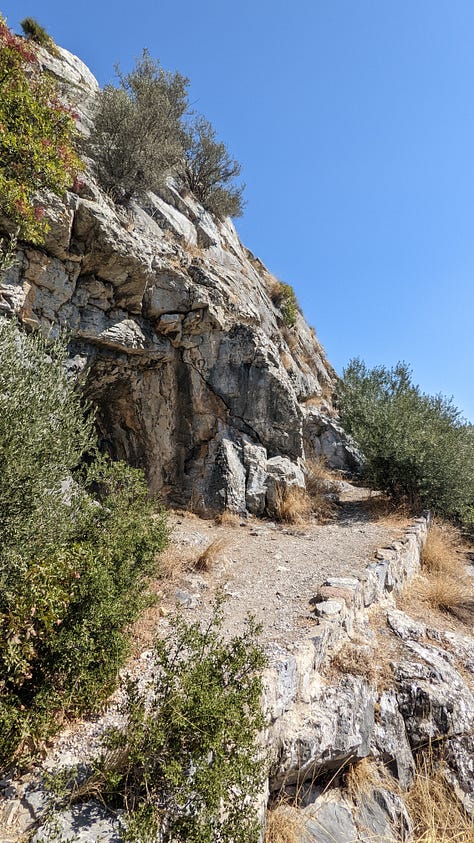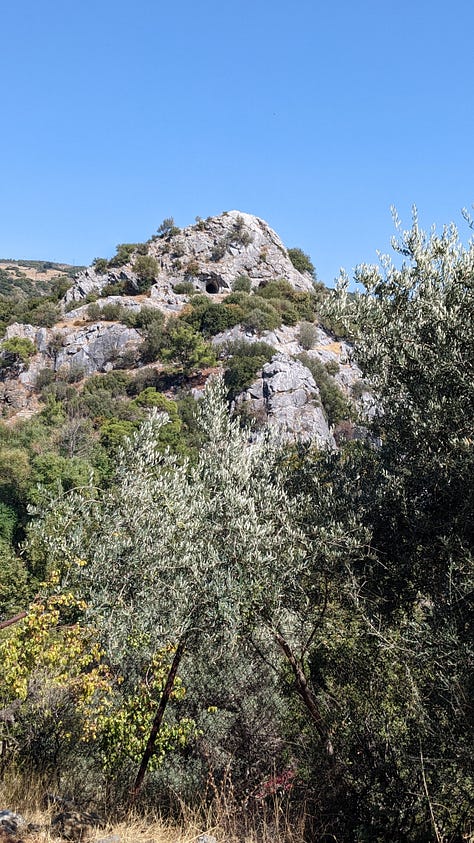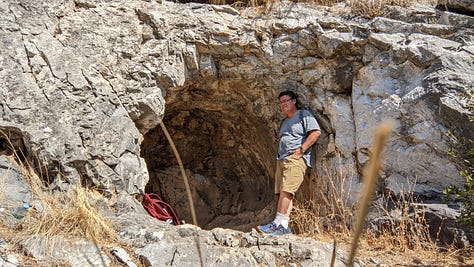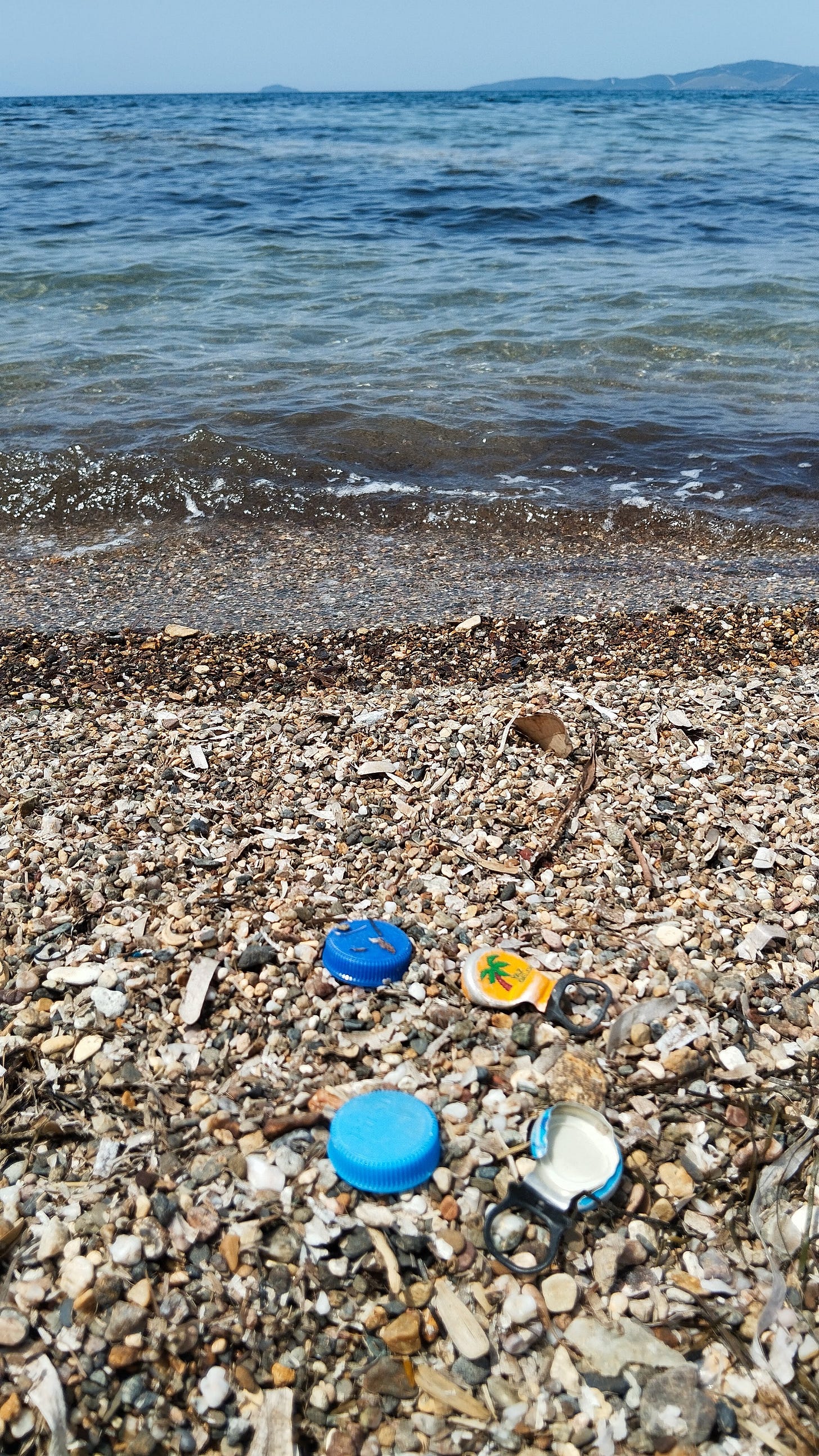Aegean Tale: Homeros & the Three Wishes
A true visit to the Homeros Vadisi (Homer Cave) in the hills above Izmir led to this tale.
Whenever people ask me what brought me to Izmir, I like to say, “Homer brought me here.”
That’s how I felt in 1999 when, working as an aid worker in Albania during the NATO-Serb War, I was given a 1-week R&R and asked to select a destination within 400 miles.
Izmir. It had to be Izmir: the birthplace of Homer, the nearest major city to the site of ancient Troy. The Iliad had been composed here. It was a city on the Aegean, the sea whose “wine-dark waters” propelled the greatest odyssey ever told.
Years later, in 2022, I accepted a job in Izmir. I would teach high school literature – Homer, among other writers. I couldn’t resist. I moved to Türkiye on August 4, one of the hottest days of the summer.
A few weeks later, I laced up my hiking boots to make a pilgrimage to Homeros Vadisi, the Homer Cave, in the hills above the suburb of Bornova.
Izmir was a different place in the 8th Century BCE, when Homeros, as he is called in this region – his homeland – composed and sang. “Old Smyrna,” as it is known today, lay close to the water at the end of the bay. The cave, as I would learn, certainly does not.
I took the bus from the Metro station in Bornova. It climbed a steep hill to the town of Eğridere. From the bus stop, I walked about 3 km down a winding road to the cave site. It lay at the entrance to a public recreation area: next to an outdoor cafe and across a cobble-stone parking lot from a paintball course.
It was hot. Well above 30 degrees. I stopped at a market and bought water. Two bottles: one to drink now, and one to carry with me. A row of metal dumpsters lay near the trail entrance. I drank the first bottle quickly, squeezed the cap, slipped it through the plastic mouth, and threw the bottle away.
The hike from the parking lot to the cave was about 150 meters, up a gravel path to a series of 3 caves in a great gray rock. Most of the pathway climbs, and while the parking area and the park below the rock are shaded, bright sun beat down upon me as I approached the famous caves, a sight where literary luminaries such as Byron had once paid their respects.



The caves were a disappointment to me, a teacher who has spent more time than most people imagining the man who compiled the epics, The Iliad and The Odyssey. Homeros was no neolithic figure, living in a cave and etching his masterpieces into stone tablets. He lived in Iron-age Ionia, where writing had been rediscovered after a “dark age” of illiteracy – and he recorded tales which had originated around the time of the Fall of Troy, had endured 300 years and had been sung ever since.
Another disappointment to me was the sight of so many discarded plastic water bottles along the path to the caves. After my first climb, I fished a plastic bag out of one of the metal dumpsters and retraced my steps, picking up discarded water bottles as I walked and stuffing them into my backpack.
I’m not sure when I started the habit of placing the caps inside empty water bottles. Perhaps it was after visiting Yoncaköy Plaj, a remote beach that was strewn with more plastic bottle caps than seashells. I want to keep small pieces of plastic from polluting the world. I wanted to honor the greatest writer of all time. That’s why I cleaned up the homesite of Homeros. And that is why I uncapped every bottle I collected, squeezed the cap in half, and slipped it inside the bottle.
The last bottle I took from the bag looked like all the others. It was clear inside; it weighed the same as the other empty bottles. But when I took off the cap, a vapor poured out, gathering in clouds, first above and then surrounding me. I could no longer see the path to the caves, or the cafe, or the paintball course.
The cloud grew dark and cold. A figure appeared: of normal height, middle-aged, a bearded man with light, gray eyes and a slight paunch in his tummy. Homeros! His beard was thinner than it looked in the statues. His eyes had laughter lines at the corners, and his cheeks were creased with long dimples.
The figure took a deep breath, exhaled, and smiled. “It’s good to be Homeros!”
I grinned.
“Thank you for releasing me.” He stretched his arms and twisted his shoulders, adding, “Sometimes you take a drink, and sometimes the drink takes you!”
I looked around to make sure I wasn’t dreaming. I could still see the paving stones at my feet, but a cloud surrounded me. The only light came from the uncapped bottle I held in my hand.
“You know what this means,” the poet continued. He grinned and raised an eyebrow.
I had read enough Turkish tales to know about genies and the wishes they granted those who released them from confinement.
“You’re Ionian Greek,” I replied. “Not Persian or Arab.” I knew of no Greek myths that involved genies or wishes.
“I am Turkish now,” the figure replied with a wink. “That means I’m a little bit of everything. And I want to give you three wishes.”
Honestly, I have been in thrall to Homeros for 30 years. Just chatting with him outside the Homeros Caves – his caves – was something I might have wished from some other literary genie. Now, I was talking with the writer himself, the creator of worlds that had long fascinated me.
The First Wish
“OK,” I said. “I wish for five million dollars. That should be enough to let me live comfortably for the rest of my days.”
Homeros frowned. “What is a dollar?” He put his arm around my shoulders. “You need to work with me, here,” he said. “I can’t grant something that I don’t know.” He tapped his forehead with a finger, “Or something I haven’t seen for myself.”
“Do you like horses?” he continued, “or chariots? How about armor? I’m particularly good with armor, and…” He paused and grinned, “how about a beautiful woman? Would you like one of those?”
I understood. Things that Homer had seen. Places he had been. Weapons, battles, caves, tapestries. I could work with this.
“OK,” I replied. “Take me to Troy. Let me experience the battle as it played out – let me see Hector with my own eyes.”
He grinned. “Now you’re talking.” There was an opening in the clouds around us. I walked through it with Homeros, his hand still on my shoulder.
We stepped into the middle of a wide plain. A breeze poured in from the sea, and I could see hills in the distance.
Suddenly the air was cleft with the clattering of wheels and the galloping of horses’ hooves. I fell to the ground as the wheels passed centimeters from my feet. A flash of golden armor and a piercing war whoop. A shield mounted on the side of the car.
I looked at my guide. “Achilles?”
He smiled. “You fell for it too, just like the Trojans.
“Patroclus!” I exclaimed. “God, I love this scene.”
I looked to my right. Hundreds of soldiers approached in the wake of the chariot, running towards battle. I was surprised by their motley appearance. There were no uniforms. About half of the warriors wore helmets. Armor of different styles & colors covered shins, chests, and midsections. Half of them carried spears, others were archers, a few even stopped to pick up heavy stones for the attack.
“Don’t worry, you’re safe,” Homeros whispered. He helped me up, and we began to jog along the Achaean attackers. “They can’t see us, nor can they hit us with a weapon.”
“They could knock us down,” I replied, dusting myself off from my fall.
“You’re right about that.”
I scanned the attackers, looking for any heroes I might recognize. “I see Ajax,” I told my guide, pointing toward a giant man, a head taller than any other, running close behind Patroclus’s chariot.”
“Bulwark of the Achaeans!”
“I think I see Agamemnon,” I continued. “He has a gleaming helmet, and a long, blue, horsehair crest.”
“That’s him. His brother should be nearby.”
I spotted a red beard jutting out below a bronze helmet.
At that moment a loud cry lashed the attackers, a thousand voices cheered as one. The Trojan army stood its ground at a place before the river, where two hills narrowed the martial plain.
This was a great army! Every soldier wore a red tunic, a thick leather belt, and bronze guards on the chests and shins. An officer whose helmet bore a red crest, rode a horse back and forth behind the line, exhorting his troop with a distinct, deep voice. Hector. He descended as Patroclus approached with the Achaean vanguard.
Patroclus’s chariot slammed into the Trojan line with a great crash. He was quickly surrounded and for a few moments, until Ajax and other warriors arrived on the scene, he was at the center of a scrum of screaming, slashing, falling soldiers.
Soon after the Achaean vanguard arrived, however, I noticed Patroclus’s chariot break through the Trojan line and rush onward the walls of the city beyond. He was tracked by every soldier on the battlefield: retreating Trojans and on-rushing Greeks.
We reached the walls of Troy, wide, built at a steep angle. Patroclus had leapt from his chariot and had started climbing the wall. The battlements above him were crowded with defenders shooting arrows and pelting him with stones.
At the city gates, Hector collected his troops and pushed back against the Achaeans. I scanned the battlements at the top of the wall. They were crammed with defenders, but I spotted some civilians among them, a few women with their hair covered and faces veiled, and a group of old men in embroidered robes.
There was a cry at the base of the wall. Patroclus had fallen. The fighters drew back for a moment, and I saw him rise. His helmet had fallen off, and his long, black curls fell freely around his shoulders. His skin was pale. He raised a sword and charged at a group of confused Trojan soldiers.
I looked around the battlefield and saw the red crest of Hector’s helmet moving towards the place Patroclus had fallen – the place where he continued to fight, the place where he fell – knocked off balance by a thrust from a Trojan warrior – then impaled by Hector’s spear.
There was another cry, a wail from the Greek forces. A scuffle broke out around the place Patroclus had fallen, but it abated and the Achaean attackers retreated from the death-dealing walls. Ajax carried a corpse in both arms, its black hair hanging over one elbow.
Hector arose on his horse again. He held above his head a gleaming bronze helmet and breastplate — Achilles’ armor, stripped from Patroclus’ corpse. The Trojans didn’t follow them across the plain. The great gate opened, and they filed into their city, assisting the wounded, carrying the dead.
Homeros and I didn’t follow. Instead he led me to a small door at the base of the city wall. My guide spoke to the door: “The wrath of Achilles.” It opened magically. He beckoned with an outstretched arm. “Welcome to Troy,” he said.
I walked through the door.
The Second Wish
I wasn’t in Troy. I was back at the Homeros Caves. “That was amazing!”
“Better than the book?” Homeros asked.
I laughed. “Nothing is better than the book. Still, it was amazing to experience that scene in person. With you. Thank you so much.”
“You have two more wishes.”
At that moment a breeze made its way from Izmir Bay up the Homeros Valley and brought a salt smell to the park. “The sea,” I said in recognition.
“The sea?” my guide repeated.
“I want you to take me onto a ship and guide me through the Aegean Sea.”
Homeros took a deep breath, closed his eyes, leaned back his head and grinned. “The sea,” he sighed.
Bright light poured through an opening in the cloud. We followed. Soon our feet no longer tread on cobblestones but on boards. We reached the end of a plank and hopped onto the deck of a bireme
A call from the rear set the ship in motion. Below the deck where we stood, we heard a drum beat and the groans of men. Oars emerged from the sides of the ship, tilted into the sea, and churned the water in rhythm. From the high deck, the ship seemed to crawl upon the water like a centipede. I looked around the harbor. Near the harbor mouth stood a huge, bronze statue, crowned with sunbeams, holding one arm aloft.
“Are we in Rhodes?” I asked my guide.
His face was turned to catch the breeze, which ruffled his beard and lifted his white hair from his shoulders. “You wish to see the Aegean,” he said. “And there is no better starting point than Rhodes, which lies near the place where the Aegean meets the great, white Mediterranean Sea.”
The bireme crawled across the harbor. Once on the open sea, however, sailors raised a wide sail which bellied out with a strong breeze. The oars retracted into the deck below, the drumbeat stopped, and the ship sliced silently through the waves.
We moved to the front of the ship, where we were baptized by the sea spray arcing over the prow. Dolphins swam alongside, their fixed smiles beguiling me, inviting me for a swim.
The Aegean horizon is always marked with islands. No matter where one sails, there is always an island – or mainland – in sight. The ship of Homeros shied from sailing the open sea towards Greece, instead opting to stay close to the eastern shore and glide from isle to isle.
A cave lay up the hill from the shore of the first island we passed.
“Watch this,” Homeros said. He stood at the prow, cupped his hands around his mouth, and yelled, “Hey look, it's Nobody!”
A figure appeared at the cave entrance. It filled the opening, ducked its head and emerged. It rotated its head from side to side, scanning the sea with a lone, blinded eye. “Nobody? Did someone call Nobody? Where is Nobody?” He spat in frustration, pushed away the idea, ducked, and re-entered his cave.
Homeros fell to his knees laughing, but something saddened me about the sight of the cyclops – or rather, the lack thereof.
We crossed a strait and sailed close to the mainland. A peasant girl appeared on the shore, guiding a herd of pigs who were gorging on seaweed and crustaceans. As the ship approached, she turned, and raised her scarf to cover her mouth. Her piercing eyes fixed on the ship – on me. Even from this distance, the eyes were green, alluring. I leaned over the gunwale for a closer look.
“Do you wish to become the next member of the herd?” my guide whispered behind me.
I held my hand to my lips, blew a kiss to the girl on the shore, and waved.
She dropped the veil from her face. Her lips returned the kiss, and she waved back. Then she reached forward with her staff and struck the lead pig, directing it up the trail that led away from the beach.
And so we drifted on along the Turkish coast, weaving in and out among the islands on our way. Homeros populated each island with a new monster or bewitching goddess. A few times, he invited me to join the game. “Why is the water color different in that cove?” he asked. “What might live in that small cave above the shoreline?” Soon I had populated deserted islands with my own menagerie of creatures.
A little ways north of the island of Samos, Homeros grabbed my arm. “This next isle is tricky. We won’t be safe on the ship.”
A song wafted over the waves. “Sirens?” I asked.
“The worst kind,” he said. “They only know sad songs. Songs so sad, the hearers wish to give up on life.”
“I know some songs like that,” I said, remembering a recent heartbreak. The carefully balanced life I sought to live in Izmir was joyous, but it seemed so fragile, one sad song might wreck it all.”
The song was louder now. And words joined the music that now seemed to come from everywhere around us.
It’s all your fault
She made choices to hurt you
Betray and desert you
But oh, we know:
All your fault.It’s all your fault
Run away to the world’s end
You’ll still be a scorned man
How well we know:
All your fault.
I raced from one side of the ship to the other, looking for a place to jump into the waves, but the oars of the bireme had appeared, and they were churning the water into white foam alongside the ship. I wanted to die, but I didn’t want to get hurt. Not anymore. I returned to my place beside Homeros. His eyes were filled with tears. Mine were too.
“There can be no great journey without unexpected detours, no great plot without unexpected twists,” he said. “And there can be no great odyssey…”
“Without loss of loved ones and a longing for home.” I said, completing his idea.
He smiled at me and leaned his head against mine in the manner Turkish men greet one another. “Great minds,” he said, tapping two fingers to his temple.
Minds? I thought. My guide, Homeros, had said, “Minds”? As in him and me?
I could no longer hear the sirens’ song of sadness. My mind soared high with the compliment. Soon I heard the scraping of oars returning inside the ship and the cease of the drumbeat. We were out of range.
We rounded a peninsula and viewed another strait on the horizon, Chios Island on the left and the city of Çeşme to the right. The bireme veered to port. “Be careful,” my guide whispered, “and DUCK!”
We hit the deck, as six sets of jaws snapped shut centimeters above us. Scylla.
“The worst Greek islander you can imagine,” Homeros growled. “But Scylla isn’t the worst thing about Chios. They have the gall to call me a Chian there!”
I smiled. “That sounds bad.”
“I will always be a Smyrnian,” he said before correcting himself, “I mean, Izmiri.”
The oars rolled out the sides of the bireme again, and the drumbeat beat a double time. I noticed that the prow of the ship was pointed towards the open sea beyond Chios, but the ship seemed to be moving towards the Turkish shore.
Çeşme harbor slid into view of the starboard side, drawing closer and closer. I noticed that the harbor was filled with ships resting peacefully at anchor, but in the middle of the harbor, a great whirlpool had appeared. Charybdis. Yet ours was the only ship it had caught.
“Get ready,” Homeros told me, taking a strong grip on the gunwale. “This odyssey won’t end with a homecoming.”
The bireme entered Çeşme Harbor, traveling in tighter circles in the whirlpool. In the vortex, the prow of the ship pointed upward in a final pirouette. We let go of the gunwale together and fell backwards towards the sea.
We didn’t land in water. Instead, our feet met the cobblestones below the Homer Caves. Wafts of vapor left the cloud and blew past us in the sea breeze.
The Third Wish
I put my hands together and bowed to Homeros. “Thanks again. That was spectacular.”
“You’re good at this,” my guide replied. “The last guy I met settled for a team of six horses, a tripod full of jewels, and a golden fleece. It’s much more fun writing with you, Jay.”
“Thanks. I guess there is one more wish.”
“Yes.”
“But no more epics.”
Homeros shrugged his shoulders. “One can only write so many epics in a lifetime. I have hymns, if you’re interested.”
An idea occurred to me, and I clapped my hands in delight.
“I know. I want you to write an epic where I get to be a character. Grand adventures. Love. Victory. Beauty. Redemption. Inspiration. Let me have it all.”
Homeros studied me for a few moments. “That’s not what you really want.”
“What do you mean? I came to Tükiye for the epics, to see your home, to visit Troy, to see the wine-dark waters of the Aegean for myself. And you’re the world’s greatest storyteller. Surely, you can compose a tale for me.”
“You will need to write your own epic,” he told me. “I can’t do that for you.”
“Really?”
“Here’s what you do,” he continued. “Live the life you desire. Write about it. Embellish it a little – or a lot. And pay attention to the stories you encounter along the way. That’s it.”
“That’s it?”
“Jay, tell me, ‘Homeros, I wish to write my life’s epic.’”
“Homeros,” I repeated, “I wish to write my life’s epic.”
He smiled. The cloud began to thin. “There you go. You will write. Good luck.”
“But wait a minute,” I said. The cloud was thinning, and Homeros himself was beginning to fade, too.
“I wish to find an agent and a publisher. I wish that it will be read widely and enjoyed by all.”
“Sorry, Jay.” I could no longer see my guide, but I could still hear his voice. “You’re all out of wishes.”
I was standing in the park below Homer’s caves, an empty bottle in my hand. I turned it over and shook it a few times. The bottle cap rattled inside.
I threw it into the metal bin and bent down to adjust the laces of my hiking boots. Once they were secure, I rose and set off on the next epic chapter here in Türkiye.






